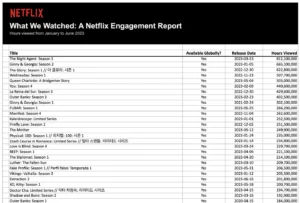
The first ‘What We Watched’ engagement report is the clearest look yet at how much people are watching Netflix’s TV shows and movies.
Netflix is going to start publishing a new report twice a year that details the most popular shows and movies on the platform. The first report, released today, details the most-watched content from January to June 2023, and it’s perhaps the best look yet at how much people are actually watching Netflix’s gargantuan library of titles.
“What We Watched: A Netflix Engagement Report” will track three metrics: hours watched, whether a show is available globally, and a show’s release date. In this first report, the first season of The Night Agent tops the list with more than 812 million hours viewed, followed by Ginny & Georgia’s second season (665.1 million hours viewed), The Glory’s first season (622.8 million hours viewed), Wednesday’s first season (507.7 million hours viewed), and Queen Charlotte: A Bridgerton Story (503 million hours viewed). Those are only the top five; the full list contains more than 18,000 titles. (Content is included if it has been watched for more than 50,000 hours.)
Netflix already offers its weekly top 10 lists, but this new report is a much wider view of Netflix’s viewership data. Streaming data was a key point of contention during the recent Writers Guild of America strike, and the new contract requires that Hollywood studios must share streaming data with the guild.

In a call with reporters, co-CEO Ted Sarandos didn’t specifically say that the company is releasing this data because of this new required transparency, though he acknowledged that Netflix’s approach to how it shares data has changed over time.
“In the earliest days, it really wasn’t in our interest to be that transparent because we were building a new business and we needed room to learn,” he says. He also argued that creators liked that because it took pressure off the “overnight ratings” model or weekend box office numbers.
However, “the unintended consequence of not having more transparent data about our engagement was that it created an atmosphere of mistrust over time with producers and creators and the about what was happening on Netflix,” Sarandos says. By sharing more data, he says it creates “a better environment for the guild, for us, for the producers, for creators, and for the press.” Sarandos says the data in the report is “the data that we use to run the business.”
Sarandos also explained why Netflix’s key metric is hours viewed. “It’s easy to understand. It mirrors third parties like Nielsen in the US. It makes Netflix very easy to compare to other streaming services,” he says.
We don’t know if other streaming services will be similarly open with their streaming data, and I’m awaiting replies on questions sent to Amazon (which runs Amazon Prime), Apple (Apple TV Plus), Disney (Disney Plus and Hulu), and Warner Bros. Discovery (Max). Bernadette Simpao, a spokesperson for NBCUniversal, which runs Peacock, declined to comment.
But if you’ve been wondering just how huge Wednesday is on Netflix, now you can see for yourself.